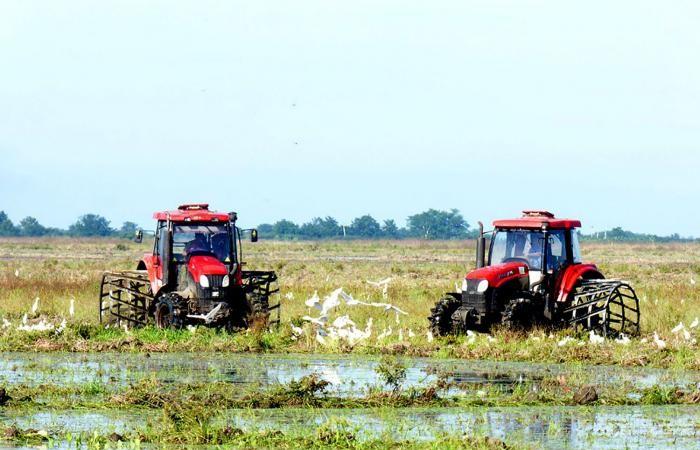La Sierpe, Sancti Spíritus.–If at this time the levels of rice planting, yields, productive volumes and satisfaction of needs are far from being those that the country potentially can and needs, it is not only because of the acute and real lack of inputs and resources in general, for a program that accentuates its strategic nature and subsequent priority at the national level.
This was just demonstrated by the exchange that the member of the Political Bureau of the Party and Cuban Vice President, Salvador Valdés Mesa, had here on Thursday with executives and producers directly linked to that economic sector.
Reasoning on the part of those who live “from grain and for grain” made it clear that not everywhere the area destined for this crop is used well, both within the state environment and outside it.
And we must all wage this battle –insisted Nelson González González, head of the rice program in Cuba–, on the basis of what corresponds to the eight companies existing in the archipelago, to the 70 municipalities that can promote the cultivation of cereal and to all the structures that the agricultural system has, the National Association of Small Farmers, sectors such as sugar and construction, as well as everyone who can contribute socially and as a family.
Updates to that program have shown the aspiration to plant no less than 200,000 hectares, whose yields, if they perform as expected, could provide approximately 86% of the volume needed.
It is easy to say and write, but it requires a lot of dedication, resources (no one denies it), knowledge, science, intelligence, rigor throughout the process and… control.
Cases like that of the UBPC Las Nuevas become an example of the way in which everyone should act: bosses and workers set up a guard system, especially at night, to protect the plantations. Days, weeks, months of surveillance end up shaping a result that completely reverses the situation of the cooperative, and has a “fantastical” impact on the income of producers and their families.
PERFORMANCE?
The old phrase “trust, but control” fits like a safety belt around the waist of every grain of rice. It is no coincidence that Deivy Pérez Martín, first secretary of the Party in Sancti Spíritus, insists on taking care of and protecting everything, from the sack of urea or rice, to the warehouses and the final destination of the production.
Next, he comments on a phenomenon that is harmful, because there are those who report returns that are lower than the potential and real results, which, in fact, opens the way for significant volumes of “surplus”, or achieved “above” to rise to abusive prices. “to the left of the market”, generating at the same time disgust, concern and even logical irritation in the population.
For this reason, on more than one occasion the Cuban Vice President stressed the core issue of control and objective contracting, as a support for having more hectares planted with rice, more yield, more production, less money spent abroad, and a greater response to the demand for an irreplaceable product on the home table.
He also stressed that the rice industry – which is in charge of production and the social function of the different forms of production – must master everything related to this sector, down to the last row of rice that is planted, by whoever plants it, not to take away anyone’s rice, but to finally organize the process and contribute more to the achievement of the country’s objectives.
Sancti Spíritus is putting its foot down in this effort. To date, 6,504 tons of rice have been produced from the effort. The province, however, requires more than 22,000 tons: some 18,000 of them for the standard family basket.
We must be very careful. The idea of achieving self-sufficiency and contributing to the nation is as viable as the decision that not one more pound of rice will reach La Sierpe from outside, because that municipality has enough land, water, producers, equipment, technology and experience to – without breaking its commitment to Cuba – guarantee by itself what it needs internally.


